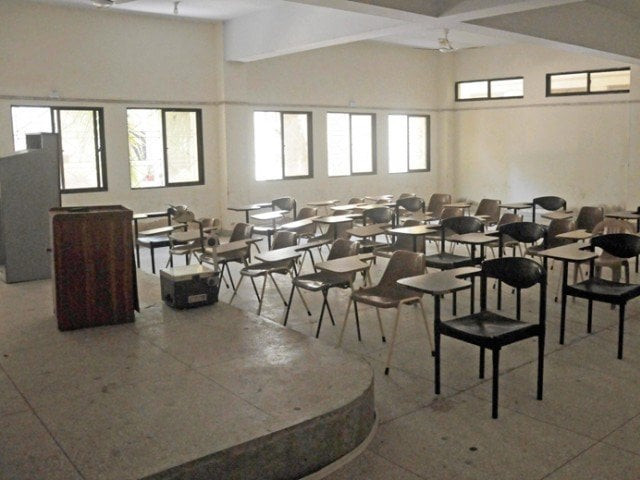Strike observed: Sindh's varsities seek autonomy
Teachers' association wants amendments in 2013 law

Teachers in almost a dozen higher education institutions boycotted classes on Wednesday. PHOTO: EXPRESS/FILE
The call of a strike was given by the Sindh chapter of the Federation of All Pakistan Universities Academic Staff Association (Fapuasa), which has given the government a week to accept its demands. "We will begin an indefinite strike from January 30," Fapuasa Sindh President Prof Naimatullah Laghari announced.
"This suspension of academic activities is a token protest for the due and just demands of Fapuasa," Prof Naimatullah said. The association's core demand is an amendment in the Sindh Universities Law (Amendment) Act, 2013. The law vested the authority of appointments of varsities' registrar, controller of examinations, finance director and some other top officials in the provincial government.
Since its enactment, the Act has attracted the anger of the academic community, who argue that the law has deprived varsities of their academic and administrative autonomy and opened the door to political appointments.
Sindh University professor challenges action against him without inquiry
Over the last five years, Fapuasa held several rounds of negotiations with ministers and officials of the provincial government to pursue its case. The association put forward a set of recommendations and it was reportedly assured that the law would again be amended in the light of their input. However, the government's assurance never materialised. Prof Naimatullah told The Express Tribune that the teachers had previously avoided the boycott of classes to press their demands, however, they were forced to use it as the last option.
"This has been the last recourse after repeated government assurances didn't materialise," he said, vowing that the teachers will not return to the classes until they are heard.
Although the provincial government has been accused of usurping the power of universities' statutory bodies, teachers' pressure has not allowed it to exercise the power of appointing top officials in varsities. In July 2015, the Sindh government advertised 16 vacancies of BPS-20 registrars and 18 vacancies of BPS-20 controller of examinations. However, Fapuasa's protest compelled the government to withdraw the advertisement.
"If the government couldn't [make an] amendment [to the] Act, it should at least promulgate an ordinance," said Sindh University Teachers Association Secretary Dr Azhar Ali Shah who has been a part of negotiations with the provincial government. He asserted that the teachers would not accept anything less than the ordinance because of the bitter experiences of the government's unfulfilled promises in the past.
Sindh govt cancels results of NTS entry test for medical colleges
According to Fapuasa Sindh General Secretary Prof Dr Minhon Khan Laghari, the other demands of the association include immediate approval of hardship cases, housing schemes for university teachers, and enhancement of PhD allowance and universities' budget. The association also demands removal of non-PhD vice-chancellors and retired officials as well as grant for PhD and post-doctoral scholarships for teachers and improvement in the security. The association also wants appointment of academicians in the Sindh Higher Education Commission which has remained moribund since its establishment.
Speaking to Express News, Fapuasa Pakistan General Secretary Shakeel Farooqi said the teachers were hoping that Chief Minister Murad Ali Shah would address their concerns soon. "The issue is not political and there should not be any ego obstructing its resolution," he said, adding that by suspending classes, the association gave a message to the government to take the varsities' issues seriously.



















COMMENTS
Comments are moderated and generally will be posted if they are on-topic and not abusive.
For more information, please see our Comments FAQ